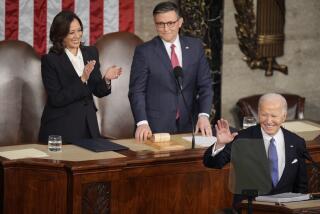Iraq Debate Heats Up After State of Union
- Share via
After President Bush’s State of the Union address last week, a man from Waldoboro, Maine, shot off a tart, terse response to the editor of the Boston Globe. The true state of the Union, lamented Steve Cartwright, “is a mess.”
Bush, he declared, had failed to make “a convincing case” for war or offer “any serious plans” for the economy or environment: “I think it’s high time a child came forward to point out that the emperor has no clothes.”
Zap.
Across the continent, another correspondent was at work. In a letter to the San Francisco Chronicle, Michael Nevin Jr. of Petaluma declared himself pleased with the speech, in particular Bush’s use of “specific intelligence information supporting the fact Iraq has not complied with inspections.”
“However, his critics, including this paper” -- and here it’s easy to imagine the man’s face flushing red, his fingers punching down harder with each keystroke -- “want a ‘smoking gun.’ Would mustard gas in Tel Aviv or VX nerve agent in Detroit be enough for your ‘smoking gun?’ ”
Pow.
For a long time, the war debate seemed strangely muted. Traveling around the country the last few months, it has been possible to get people talking about the subject, but the conversation almost always needed to be jump-started.
Rarely were there opportunities simply to eavesdrop on everyday people debating on their own dime.
Maybe it seemed too abstract.
Last week, as the president advanced the case for war and his advisors spoke ominously of entering a “final phase,” as U.N. weapons inspectors issued less than sanguine assessments and France stamped its feet, and as images of ever more troops deploying to the Middle East became daily media fixtures, something changed. Suddenly, the topic of war could no longer be avoided, the channel simply changed to, say, the next installment of “The Bachelorette.”
And so it was that Americans in droves turned to one of the democracy’s oldest, and quaintest, tools -- the letter to the editor.
To read through hundreds of these missives, culled by computer from papers around the country, was to feel somewhat like a referee in a wrestling match or a judge in divorce court. Often they seemed not so much written as screamed.
“The past months of Bush’s warmongering and crackdown on civil liberties silenced my voice,” admitted Tracy Abell of Lakewood, Colo., in a letter to the Rocky Mountain News. “Well, no more. I am awake and I am angry. I refuse to accept the propaganda coming from the White House.
“Homeland Security Act is fascism. Total Information Awareness is fascism. Muzzling the Freedom of Information Act is fascism. War against Iraq is about oil. Bush’s tax plan is class warfare.”
A couple of major fault lines could be traced coursing through the discussion.
Those who supported war often saw a clear connection between the need to invade Iraq and the terrorist strikes of Sept. 11. Many expressed faith in Bush, convinced he must be holding an evidentiary trump card. Frequently they argued that history was on their side.
“Peaceful mediation got Neville Chamberlain nowhere with Hitler in 1938,” Andy Spaeth of Groesbeck, Ohio, observed in his letter to the Cincinnati Enquirer. “Do you think it will work with his 20th century counterpart in 2003?”
Those who opposed war with Iraq tended to dwell on the White House’s shifting rationales and what they perceived to be subterranean motives -- oil, personal revenge, a lust for empire, oil, partisan politics, oil.
“Let me see if I have this correct,” A.D. Coles of Richardson, Texas, wrote in a letter to the Dallas Morning News. “The Bush administration first said we should go to war with Iraq because of Sept. 11. Next, it was Iraq’s link to Sept. 11. Then, it was Iraq’s link to al-Qaeda and their link to Sept. 11.
“Next, it was because of Saddam’s biological weapons, followed closely by the Iraqis’ nuclear weapons capabilities. Soon thereafter, it was the imminent threat Saddam posed to the U.S. Recently, the outcry is Saddam is not complying with the United Nations resolution. And now, after the State of the Union speech, it’s for the liberation of the Iraqi people.
“And we want Saddam Hussein to come clean?!”
The skeptics offered history lessons: “America,” Joe DiBona wrote to the Durham (N.C.) Herald, “has been guilty of some stupid and costly adventures -- the war with Mexico, the Spanish-American War, Vietnam and so on -- but frankly this current insanity takes the cake.”
The economy was carried into battle by both sides.
Enter Texan Kerry McGrath, in the Austin American-Statesman: “Even if I didn’t care about the moral aspects of killing thousands of Iraqis with high-tech weapons dropped from the sky, or the political impact of taking such action in the face of widespread world opposition, or the enduring hatred that America and Americans will gain from Muslims worldwide (and I do care about those things), President Bush’s ceaseless war talk is killing the stock market and the economy.”
Followed by Casey Merritt, of Boca Raton, Fla., who in the Palm Beach Post took note of surveys showing a slippage of support for war: “Do the people who participated in these polls remember what happened after Sept. 11, 2001? Do they see what happens to the stock market every time a terrorist act occurs overseas? Do they not realize that the threat of terrorism is a major factor in the weakened economy?”
Sarcasm and satire are staples of the letter-writer’s craft, but some of the war missives overflowed with earnestness.
“The president is positive that Iraq is a threat to our country,” went a letter to the Providence Journal, “and that Iraq has weapons of mass destruction. If proof of this were presented to the American people, I’m sure that the vast majority of us would back him in any action he proposed against the Iraq regime. I know I would.
“But if we invaded Iraq without this evidence, most Americans would be very uncomfortable with our country taking on a new role in world affairs. We would no longer be protectors of freedom. We would be the hated aggressor. You know what happened to hated aggressors in history.” It was signed by Richard Blackstone Sr., of Blackstone, R.I.
Working through the pile of printouts, one could almost see letter-writers like this Blackstone at their stations, hunched over notepads or keyboards all over America, from Palm Beach to Portland, in hill country and desert towns, carefully revising each sentence, hauling rough drafts down to the coffee shop for peer review -- and then, finally, rushing to the post office to send off a message meant to change a nation’s mind -- in no more than 400 words.
“I don’t want anyone else to get hurt,” Brett Dennis, a 16-year-old Minnesotan, wrote in the Duluth (Minn.) News Tribune. His uncle was in the Air Force, he explained, and someone from the post already had been killed in Afghanistan.
He would close on a hopeful note that was almost painful in its innocence: “I wish that our president could read this letter. Maybe he would have second thoughts about starting a war.”
More to Read
Sign up for Essential California
The most important California stories and recommendations in your inbox every morning.
You may occasionally receive promotional content from the Los Angeles Times.














